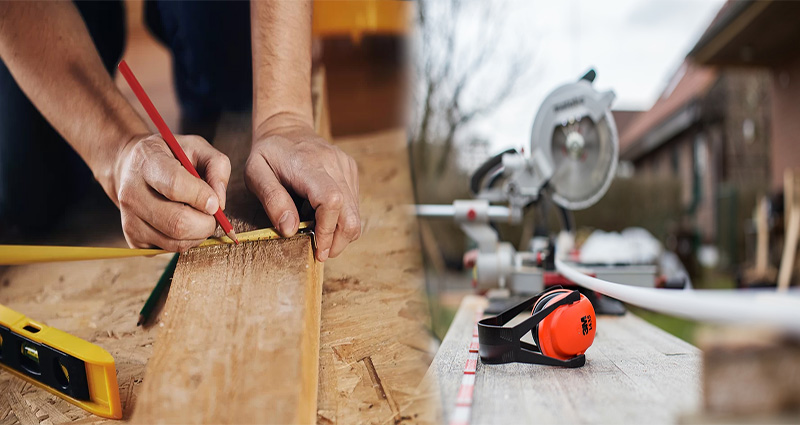Choosing a home improvement contractor is no easy task. With so many choices and so little information, it can be difficult to tell the difference between good contractors and bad ones. The best way to ensure that your renovation project goes smoothly is to do your research ahead of time and ask lots of questions before signing anything. Here are some tips for vetting contractors:
Check references
- Ask for references from previous clients.
- Make sure to call the references and ask about the quality of work, communication, and timeliness.
- Ask about their experience with the contractor as well as what they think about his/her professionalism and attention to detail.
Understand the contractor’s approach to work
You should also be sure to thoroughly understand the contractor’s approach to work. This includes their work ethic, communication skills, and ability to adapt to your needs. If a contractor is not willing to meet with you in person or via video chat before signing an agreement, that should be a red flag. You want someone who takes pride in their craft and will do everything they can for their clients–and if they won’t even talk with you before getting started on the project, then maybe they aren’t the right fit after all!
Inspect contractors, not just their work
Inspect contractors, not just their work
When you’re looking for a home improvement contractor, don’t just look at the finished product. Instead, inspect what they do and ask yourself if it’s up to your standards. Ask for references from previous clients and examples of their work (if possible). Look at photos of projects that have been completed by the contractor in question; ask other people about their experience with them as well (like on Yelp).
It’s important to remember that contractors aren’t always responsible for things going wrong during a renovation project–sometimes homeowners make mistakes or pick poor materials themselves! But when something does go wrong with your renovation project because of poor craftsmanship from a contractor, it can be very difficult and time-consuming to get them back on track so that everything gets done properly once again
Beware of contractors who want to be paid up front.
Beware of contractors who want to be paid up front.
A common scam is for a contractor to demand payment before starting work, or even just after signing a contract. This is often done by unscrupulous companies that are trying to take advantage of you and your money. You should never pay any money up front unless it’s part of an approved financing plan or other contractually agreed upon arrangement, such as having the contractor provide materials needed for the job (like lumber).
Additionally, if you do agree upon paying cash up front, make sure there’s something in writing stating that this was done willingly by both parties involved in the transaction; otherwise it may be considered theft!
Get a written contract.
- Get a written contract.
Contracts should be clear, detailed and thorough. They should include a list of the work to be done, the price and payment schedule, materials to be used and any warranties offered by the contractor.
Consider hiring more than one contractor.
You should consider hiring more than one contractor. It’s a good idea to get at least two estimates for each project, and even then you may find that both contractors provide different options for your home improvement needs.
The first thing you should do is ask friends or family members if they know any contractors who would be a good fit for the job. If not, check out reviews of local businesses online or in newspapers; look at social media pages and see which ones have the most followers; and ask around at work or church too!
When hiring a second contractor (or third) make sure they’re up-front with their pricing structure so there are no surprises later on down the line when it comes time for payment. Also make sure they offer warranties on their workmanship–you don’t want something going wrong after just two years because no one told you what was covered under warranty!
Check out the contractor’s insurance coverage and licensing.
When you’re looking for a contractor, there are several things you should check out. One of the most important is their insurance coverage and licensing. Make sure that your contractor has both covered, so that they can be held accountable if anything goes wrong during your project.
Checking out their reputation is also very important. A good way to do this is by asking family or friends who have worked with contractors before about theirs; if they don’t have any recommendations for someone, look online at reviews from other people who have used them before (or even just Google them). You’ll want someone with a good track record and positive feedback from previous clients so that you know what kind of quality workmanship they provide–and so no one gets hurt!
Get a written warranty on materials and labor.
Once you have chosen a contractor, make sure he or she provides a written warranty on materials and labor. This should be in writing, signed by the contractor and transferable should you sell your home later. A warranty should cover any defects in materials as well as labor for one year after completion of work.
Ask about warranties for major appliances or systems.
When you purchase a new home, the seller is required to provide you with an owner’s manual. It contains information about how to maintain your furnace and other major systems, along with contact information in case of problems. The same should be true for contractors who do work on your property. If they don’t provide written warranties covering their workmanship, find another contractor!
Warranties should cover major appliances or systems (like heating/cooling units) and be transferable if you sell your house within five years of having it installed by the contractor who provided them. This means that if something goes wrong after this period has elapsed (and it often does), then whoever owns the home next will still have some recourse against the previous homeowner who signed off on those plans originally–not just against the company itself!
There are good contractors out there, it just takes some work to find them!
You can find a good contractor, it just takes some work to do so.
- The internet is your friend when it comes to finding contractors. There are many websites that list local contractors and their contact information, including Yelp and Angie’s List (both free). You can also search for reviews of companies on Google or Facebook.
- Ask friends and family if they have any recommendations for home improvement contractors they’ve used in the past–this can be especially helpful if you’re working with an older home that requires specific expertise in order to make sure everything remains up-to-code throughout the process!
Finding a good home improvement contractor can be a challenge, but it’s worth it for the peace of mind that comes with knowing your project will be done right. With these tips, we hope you’ll be on your way to finding the contractor who’s right for you!











